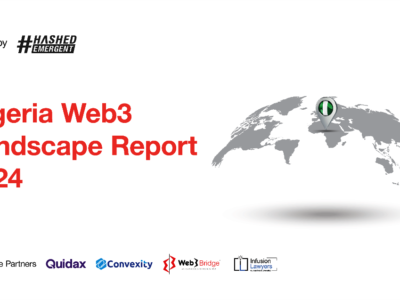A new study launched by Boss Beauties highlights fast-growing use of web3, and the need for more education resources to ensure girls are not left behind.
The first global study to measure Gen Z’s attitudes towards web3 found that almost 7 in 10 Nigerian Gen Z-ers wanted their schools to teach them more about the virtual and digital environments in which many find themselves when not in class.
RELATED: 5 ways to better manage your Gen Z employees
The study, conducted by New York-based Boss Beauties, is the most up-to-date comprehensive look at how 16-25-year-olds (and parents) in seven countries view the knowledge gaps, risks, and future of web3.
Topline findings include:
- Over two-thirds (68%) of Gen Z in Nigeria wish their school had taught them more about web3.
- Outside of school, the same number (68%) of Gen Z-ers would like more access to credible educational resources about web3.
- 49% of Gen Z in Nigeria have encountered someone pretending to be someone else online, the highest number of all the surveyed countries.
- Nearly half (47%) of Nigerian Gen Z surveyed say they spend more time hanging out with friends online than in real life.
- 65% of Nigerian parents surveyed feel concerned about privacy and security risks online.
The report looks at web3, the next generation internet, through the eyes of Gen Z. Web3, which is fast evolving, is built in the cloud and on blockchain technologies that enable users to interact with decentralized apps, including online gaming, virtual communities, cryptocurrency platforms, and NFT marketplaces. The study was commissioned by Boss Beauties, a media and entertainment brand founded in September 2021 with a collection of web3 digital collectibles. Boss Beauties continues to provide the tools, skills, and connections to safely bring the next 1 million women and girls into a web3 world. The report is based on in-depth polling by EPG in countries where web3 is established and rising in popularity.
Gen Z are hungry for more web3 knowledge, the global survey finds. In Nigeria, over two-thirds (68%) of Gen Z wish their school had taught them more about web3. Outside the classroom, the same proportion – 68% – would like more access to educational resources, such as explainer videos, on the topic. Nigerian parents agree, with 46% wishing to access more educational resources about web3 for their children, and the same percentage (46%) saying web3 should be taught in schools.
This lack of educational resources is especially worrying as girls have a historical tendency of getting left behind when new technologies emerge.1 Currently, women account for just 28% of engineering graduates, and only one in five AI professionals. If the gender imbalance in tech persists, this could have knock-on effects on the global economy, given that the World Economic Forum expects 77% of jobs to require digital skills by 2030.
The new study, which encompasses seven countries – Nigeria, US, UK, Brazil, India, Singapore, and UAE – is based on in-depth polling of 3,869 people, of which 1,906 were aged 16-25, and 1,133 were parents or carers over 25.
Lisa Mayer, Founder and CEO of Boss Beauties, said:
“Policymakers, educators, and web3 companies all need to come together and ensure that young people and their parents have the tools and knowledge they need to stay safe and make informed decisions as they navigate this fast-changing digital space.
“If used properly, web3 can allow Gen Z to feel empowered, connect with people around the world, and become the change-makers they want to be. But we know from history that when new technologies emerge, girls get left behind. Web3 will only continue to grow in the years to come, so it is essential we act now to make sure girls are able to understand this technology, preparing them for the future of the workforce and for how the world is changing.
“At Boss Beauties, we will continue to keep our focus on educating, connecting, and mentoring women and girls so they can be everything they want to be. We are reaffirming our mission to bring the next 1 million women and girls into a web3 world by providing new research that can help us, as well as others building in this industry, create the tools and education women and girls need.”
Lila Thomas, Vice-President of Brand and Strategic Partnerships at Boss Beauties, said:
“As our research shows, although Gen Z are embracing web3, many are still unaware of the risks that it entails – especially girls. It’s particularly alarming that more than 40% have come across someone pretending to be someone else online.
“Our goal at Boss Beauties is to elevate women and girls by giving them the tools they need to succeed. That starts with being safe online, and it’s why education is a part of everything we do.”
Faced with a lack of educational resources on web3, a third (32%) of Nigerian Gen Z respondents say web3 sounds exciting, but they don’t understand what it is. Nigerian Gen Z-ers tend to turn to online searches (34%) as their most popular method to learn more, same as their parents (29%).
Outside of the classroom, few Gen-Zers are able to turn to their parents for guidance about web3. Just 15% say their parents are “somewhat” or “well” equipped to teach them about web3. In line with this, half (51%) of Nigerian parents surveyed say they struggle to explain web3 to their children, and almost half (44%) say they don’t understand what web3 is.
The need for more educational resources on web3 is particularly urgent as the survey uncovered alarming risks that young people have faced in this emerging digital space. A staggering 49% of Nigerian Gen Z say they have come across someone pretending to be someone else online, the highest percentage reported out of all seven countries surveyed.
The survey results indicate that Gen Z in Nigeria seem relatively unconcerned about the risks of using web3, with only 25% of Nigerian Gen Z acknowledging expenditures such as NFT and cryptocurrency as “highly risky”. Less than half (41%) of Nigerian Gen Z know how to open and manage a crypto wallet, while 18% are entirely unfamiliar with it. These results indicate that exposure and variety of experiences with web3 vary among young people.
Perhaps because parents are not digital natives – unlike the younger generation – they have more reservations as to how their children use web3 and how dangerous the digital space can be. 73% of Nigerian parents surveyed were likely to say they were neither highly nor somewhat informed about the risks and threats around using web3. They were the second most concerned (65%) of all parents surveyed about privacy and security online. Globally, only 8% of mothers and 13% of fathers view it as a completely safe space.
The findings highlight the need for policymakers, web3 companies, and the education community to come together and find ways to enhance understanding of the new digital space among young people and their parents – especially as it will only grow more popular in years to come. Less than half (42%) of Nigerian parents and caregivers surveyed have had a conversation with their children about web3. Just over a third (35%) of this cohort say they know what their children are doing on web3. Nigerian parents say virtual communities and decentralized finance were the two most common things their children used on web3 (21% each).
The survey shows that Nigerian Gen Z are most likely to use web3 for decentralized finance such as cryptocurrency (44% of boys compared to 29% of girls). For girls, this is followed closely by virtual communities and networking (29% also, compared to 16% of boys).
The study sheds light on Gen Z’s shopping habits on web3 in Nigeria. Similarly to other countries, Nigerian Gen Z preferred crypto purchases, with 72% of those surveyed who made a web3 purchase saying their most recent item was cryptocurrency.
Web3 is also set to play a bigger role in Gen Z’s social dynamics, with many seeing it as an extension of their real-life self. Nearly half (47%) of young people surveyed in Nigeria say they spend more time hanging out with friends online than in real life. Some also find it easier to build relationships online, with 50% of Nigerian Gen Z girls agreeing that it is easier to form relationships on web3 than in real life, compared to 46% of boys.
KEY GLOBAL FINDINGS ACROSS SEVEN COUNTRIES:
- Compared to Gen Z boys (15%), nearly twice as many Gen Z girls (27%) are unfamiliar with how to open and manage a crypto wallet.
- When parents were asked the same question about opening and managing a crypto wallet, 68% of mothers and 60% of fathers globally said they either didn’t know how to or were unsure.
- When parents are asked how much they thought their children spent on their last transaction, they tend to overestimate: 44% believe it was in the region of US$101-500 instead of US$20-100, which is what Gen Z say their most popular category of spending is.
- 58% of Gen Z respondents are concerned about their privacy and safety online.
- 26% of Gen Z girls say they have been “subjected to abuse or harassment, e.g. body shaming, misogyny” online, a figure only slightly lower for boys (24%).
COVER PHOTO: The Guardian Nigeria

































